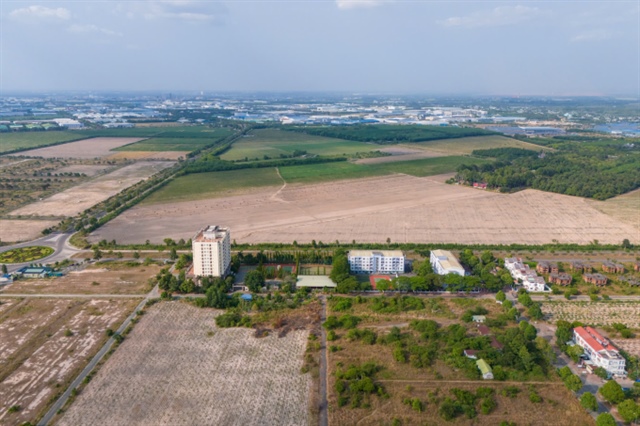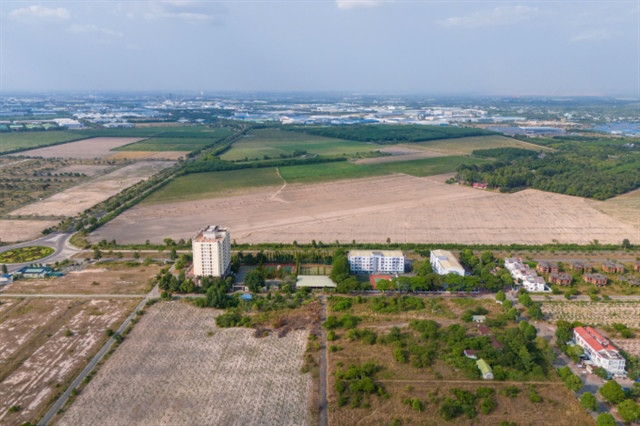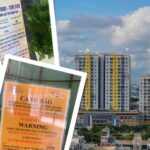Ms. Đức Hạnh, a resident of District 11 in Ho Chi Minh City, is facing a difficult decision: whether to continue with the payment of nearly VND 4.3 billion to acquire two land plots in Nhơn Trạch or forfeit her deposit of VND 450 million. In mid-March, when rumors circulated about the possible merger of Nhơn Trạch district into Ho Chi Minh City, Ms. Hạnh, upon the recommendation of an acquaintance, decided to place a deposit on two land plots near National Highway 51, anticipating a doubling of the land prices.
However, as the rumors failed to materialize, the market began to cool down from the beginning of April. Ms. Hạnh found herself in a predicament as the deadline for full contract payment approached. “In the past few weeks, I’ve been trying to find buyers for these two land plots, but to no avail. If I can’t sell them this week, I will have to forfeit my deposit as I don’t have the funds to complete the transaction,” she shared.
A similar situation unfolded for Mr. Phước Hải, an investor from Tay Ninh province. In February, he placed a deposit of VND 150 million to purchase a land plot worth over VND 2 billion in Phu My, Ba Ria-Vung Tau province, with the expectation of profiting from the rumored merger with Ho Chi Minh City. However, instead of the anticipated surge in prices, the Phu My market began to cool down from mid-April following a series of advisories from the local government and changes related to administrative units. Land prices stabilized, and liquidity decreased.
According to Mr. Hai, as he had purchased at the peak of the market, reselling proved challenging due to the higher prices compared to the current market rates. With the deadline for the transfer contract approaching and no prospective buyers in sight, he had no choice but to forfeit his deposit.
“I don’t have the capacity to borrow over a billion dong to invest in land, even though I know that this market still has potential in the next few years,” Mr. Hai shared regretfully.
Mr. Phạm Anh Tuấn, a resident of Thu Duc City, shared a similar experience. In late February, he borrowed nearly VND 1 billion to purchase a residential land plot in Nhơn Trạch, anticipating profits after the area’s merger with Ho Chi Minh City. However, by early April, the market in Nhơn Trạch began to lose momentum. Despite offering to sell the land plot at the original price, he couldn’t find any buyers. “As I borrowed money at a high interest rate for this investment, if I can’t sell by September, I risk losing my collateral. Therefore, despite the significant loss, I have to sell,” he said.

Image: A project in Nhơn Trạch, Đồng Nai. Source: Phương Uyên |
Mr. Nguyễn Văn Phúc, a real estate broker in Đồng Nai, shared insights into the recent market trends. While the first quarter witnessed a surge of investors rushing to buy land, the second quarter saw an increase in sellers. The Đồng Nai real estate market experienced a wave of forfeited deposits as many land plots reached their payment deadlines, and investors struggled to secure funds.
“On average, out of 10 speculators, 3 to 4 would have forfeited their deposits in the past month, corresponding to a rate of 30-40%,” said Mr. Phúc.
According to Mr. Phúc, the primary reason for this situation is that Nhơn Trạch was not merged into Ho Chi Minh City as previously expected, leading to a rush of investors selling their land holdings. Those who had already made full payments chose to hold on to their land, awaiting a market recovery. Meanwhile, those facing immediate financial obligations had no choice but to accept a 10-15% reduction in prices compared to the first quarter.
A representative of a real estate exchange in Đồng Nai noted a 50-60% decrease in transaction volume for land in Nhơn Trạch and Long Thành after the announcement of the merger proposal. The market entered a stagnant state, with increasing supply but a significant decline in demand. Investors began to forfeit deposits and lower selling prices due to concerns about future development plans and administrative changes.
However, according to the representative, there is still a group of investors taking advantage of the situation by purchasing cut-loss deals from those forced to sell. The current buying prices are about 10% lower than the peak in the first quarter.
Data from research institutions also revealed a significant drop in transaction demand for real estate in areas that had previously experienced “hot” speculation due to merger rumors. According to Batdongsan, when the merger news broke, the demand for real estate in popular areas like Nhơn Trạch increased by 142%, Dĩ An and Thuận An by 70%, and Long Thành by 40%. However, in April, after the issuance of Resolution 60, the demand for real estate in Tân An decreased by 56%, Bà Rịa – Vũng Tàu by 60%, and Đồng Nai by 79%. Not only did the demand for purchases decrease, but asking prices for real estate in these areas also cooled down, falling by about 10% from the first-quarter peak.
DKRA Group’s survey also showed that in the first three months of the year, land prices had increased locally in some provinces and cities, such as Nhơn Trạch (Đồng Nai) by 30-50% and Phú Mỹ and Châu Đức (Bà Rịa – Vũng Tàu) by 20-30%. This upward trend was driven by the news of the provincial mergers. However, in April, after the official announcement of the merger proposal, the demand for real estate in hot areas like Nhơn Trạch and Long Thành began to cool down by 20-30%, and the price increase trend stalled, leading to deposit forfeitures.
Mr. Đinh Minh Tuấn, Southern Region Director of Batdongsan, attributed the market adjustments to investors’ cautious approach following official warnings and their wait-and-see attitude regarding legal and administrative developments post-merger. Additionally, some investors who misjudged the market dynamics contributed to the wave of sell-offs and deposit forfeitures, resulting in negative market sentiment.
Real estate expert Lê Quốc Kiên had previously warned about the high risks associated with land speculation based on infrastructure and planning policies. He emphasized that infrastructure and planning are long-term factors that do not generate immediate profits. Engaging in speculation and artificially inflating land prices based on herd mentality, rather than actual demand, can lead to significant losses for investors. Mr. Kiên advised investors to exercise caution, avoid following the crowd, and focus on factors that genuinely enhance the value of real estate.
Previously, the Vietnam Real Estate Brokerage Association (VARS) also cautioned that while provincial mergers could have positive effects by streamlining legal procedures and boosting supply, especially in the affordable housing segment, sustainable price increases depend on infrastructure development, transportation, economic growth, and practical exploitation potential.
To mitigate risks, VARS recommended that investors thoroughly research price levels, planning, and infrastructure development progress in the areas they intend to invest in. Locations with clear and ongoing planning that are attracting actual residents are safer and offer more potential than areas with prices driven solely by rumors.
Phương Uyên
– 05:00 14/05/2025
The Airbnb Ban: A Tale of Two Cities
“A growing number of individuals are feeling the impact of the ban on short-term rentals through Airbnb. This prohibition is stirring up strong emotions and sparking a heated debate. On one hand, there are those who feel their property rights are being trampled upon. On the other, some residents worry about the potential disruption to their neighborhoods.”
“Consumer Credit in Ho Chi Minh City Sees Positive Growth”
Consumer credit outstanding in Ho Chi Minh City reached VND 1,137 trillion as of the end of March 2025, marking a 2.3% increase from the previous year’s end. This surge in consumer credit activity signifies a robust and expanding consumption demand, positively influencing production, business, trade, tourism, and service activities across the region.
Making Way for 100,000 Affordable Homes
To meet the target of delivering 100,000 social housing units by 2030 as set by the Prime Minister, Ho Chi Minh City is leaving no stone unturned with a slew of initiatives.
The Urban Townhouse: A Surefire Cash Flow Equation in Lao Cai City Center
Located in the heart of the new Lao Cai city, surrounded by a cluster of four social housing apartment buildings housing 10,000 residents, HPX Golden Lao Cai is a business opportunity like no other. With three key infrastructure developments of national strategic importance on its doorstep, it presents an undeniable cash flow equation for 2025 and beyond.





















